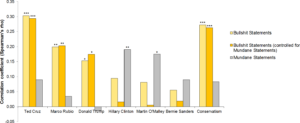I have a new favorite research topic. There is a relatively new field in sociological research on bullshit. The seminal paper in the field was only published last year (Pennycook 2015), but it seems there are additional researchers jumping onto the bandwagon. The particular paper I discuss today is about how pseudo-profound bullshit is perceived by members of US political ideologies.
In other words, do conservatives or liberals think bullshit is profound or is it just bullshit?
The paper, by Stefan Pfattheicher and Simon Schindler is called “Misperceiving Bullshit as Profound Is Associated with Favorable Views of Cruz, Rubio, Trump and Conservatism“.
In it, the author presume that conservatives will be more likely to think that pseudo-profound statements are profound. These nonsensical statements are the bullshit we’re talking about. The authors are very clear that they are not discussing exaggerations, lies, or nonsense. The example that they give of a pseudo-profound statement is
Hidden meaning transforms unparalleled abstract beauty.
These are sentences that contain lots of interesting “intellectual” buzzwords and sound as if they are vastly important. But in reality, the statements are utterly meaningless. The phrase used in the paper is ‘lack plausibility and truth from the natural science perspective”. Like all the works of Deepak Chopra for example.
The authors presume that, based on Pennycook, the ability to detect bullshit requires reflective and critical thinking (another way to say skepticism). Also, based on other works (Kemmelmeier, 2009; Jost 2003; Hinze 1997), the authors presume that conservatives tend to use intuitive thinking and reject cognitive complexity. Judging by an admittedly small sample size of people I know, I confirm that this is probably a valid presumption.
Thus, based on the assumptions that individuals need to process pseudo-profound bullshit statements in a reflective and critical thinking mode to detect their vacuous content whereas conservatives compared to liberals are less likely to engage in the reflective and critical thinking mode but are more likely to use the (in this case maladaptive) intuitive thinking mode, we expect that political conservatism is related to judging bullshit statements as profound.
The study used Pennycook’s 10 statement test for pseudo-profound bullshit. The authors also added some not bullshit statements as a control. They also asked respondents to rate the 6 leading US presidential candidates (at the time Trump, Rubio, Cruz, Sanders, Clinton, and O’Malley) and to self judge their own conservative/liberal ranking.
The results were pretty much as expected. I should add that both myself and the authors of the paper do not think that this is a statement on the relative intelligence of any member of any political party or anything else. It’s purely a small group study to discuss trends in cognitive effort.

The figure shows the correlation between the favorability of the six candidates and a measure of the profoundness of the bullshit and mundane statements (the control statements).
As you can see, conservatism (especially related to Cruz) was positively correlated with judging bullshit as profound. This was not true of he mundane statements.
Meanwhile, no significant relationship exists between the more liberal leaning respondents and the profoundness of bullshit. However, the more liberal people did tend to see profoundness in the mundane statements.
The authors make five notes
- The correlations are small to medium sized.
- The sample is not representative of the US population.
- The study is correlational.
- The study does not say why the correlation may exist (i.e. not causational).
- it is likely that conservatives are receptive to pseudo-profound bullshit but not other forms of bullshit.
Personally, I think that there are two factors that should be considered. The first is the desire/need of conservatives to have the respectability and air of competence that comes from pseudo-profound bullshit. They see smart people saying things in complex ways without understanding that there are reasons for that complexity. They want to be perceived as intelligent and are thus, more likely to think complexity equals intelligence (sort of like our creationists).
Second, is the idea of accepting ideas that they think supports their beliefs (another trait of creationists) regardless of if they understand what they are hearing and whether it actually supports their beliefs or not.
The authors mention a third idea and that’s just, they don’t have the critical thinking skills needed to correctly judge bullshit from not bullshit. I mean, how else do you explain some 40% of the US population that actively and regularly works against their own best interests. For example, my dad, a retiree living solely on social security and medicare, routinely votes for the party that tries to shut down and reduce social security and medicare.
The authors also mention that conservatives might be perfectly good at judging other forms of bullshit that does not require the cognitive effort of pseudo-profound bullshit. For example, lies and exaggerations.
I’ll leave this with a quote from Pennycook (Pennycook G, Cheyne JA, Barr N, Koehler DJ, Fugelsang JA. It’s still bullshit: Reply to Dalton (2016). Judgm Decis Mak. 2016;11: 123–125.)
[b]ullshit that is viewed as profound is still bullshit.
_________________________________
Pennycook G, Cheyne JA, Barr N, Koehler DJ, Fugelsang JA. On the reception and detection of pseudo-profound bullshit. Judgm Decis Mak. 2015;10: 549–563.
Kemmelmeier M. Authoritarianism and its relationship with intuitive-experiential cognitive style and heuristic processing. Pers Individ Dif. 2010;48: 44–48. doi: 10.1016/j.paid.2009.08.012
Jost JT, Glaser J, Kruglanski AW, Sulloway FJ. Political conservatism as motivated social cognition. Psychol Bull. 2003;129: 339. pmid:12784934 doi: 10.1037/0033-2909.129.3.339
Hinze T, Doster J, Joe VC. The relationship of conservatism and cognitive-complexity. Pers Individ Dif. 1997;22: 297–298. doi: 10.1016/s0191-8869(96)00171-7
